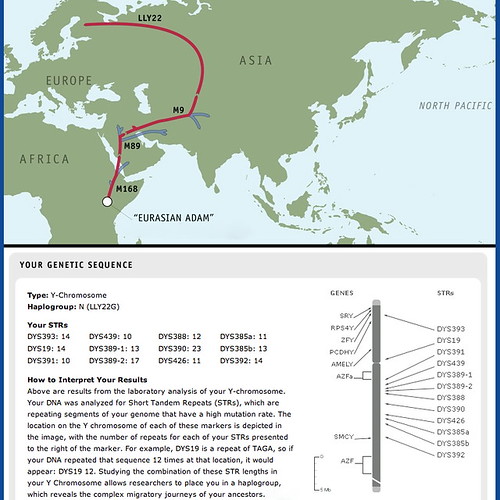But before I go…here is one interesting article about genetic research which suggests that more then a 6 Billion people currently present on Earth originate only from 2000 individuals in the past.

Following different routes out of Africa, successive waves of early humans migrated into new territories, eventually populating the entire globe save Antarctica. This map shows this complex web of migrations in their broadest strokes.
Out of Africa
Somewhere between 80,000 and 50,000 years ago, Africa saved Homo sapiens from extinction. Charting the DNA shared by more than six billion people, a population geneticist—and director of the Genographic Project—suggests what humanity "owes" its first home.
Do you think you know who you are? Maybe Irish, Italian, Jewish, Chinese, or one of the dozens of other hyphenated Americans that make up the United States melting pot? Think deeper—beyond the past few hundred years. Back beyond genealogy, where everyone loses track of his or her ancestry—back in that dark, mysterious realm we call prehistory. What if I told you every single person in America—every single person on earth—is African? With a small scrape of cells from the inside of anyone's cheek, the science of genetics can even prove it.

The human genome, the blueprint that describes how to make another version of you, is huge. It's composed of billions of sub-units called nucleotides, repeated in a long, linear code that contains all of your biological information. Skin color, hair type, the way you metabolize milk: it's all in there. You got your DNA from your parents, who got it from theirs, and so on, for millions of generations to the very beginning of life on earth. If you go far enough back, your genome connects you with bacteria, butterflies, and barracuda—the great chain of being linked together through DNA.
What about humanity, though? What about creatures you would recognize as being like you if they were peering over your shoulder right now? It turns out that every person alive today can trace his or her ancestry back to Africa. Everyone's DNA tells a story of a journey from an African homeland to wherever you live. You may be from Cambodia or County Cork, but you are carrying a map inside your genome that describes the wanderings of your ancestors as they moved from the savannas of Africa to wherever your family came from most recently.
This is thanks to genetic markers—tiny changes that arise rarely and spontaneously as our DNA is copied and passed down through the generations—which serve to unite people on ever older branches of the human family tree. If you share a marker with someone, you share an ancestor with him or her at some point in the past: the person whose DNA first had the marker that defines your shared lineage. These markers can be traced to relatively specific times and places as humans moved across the globe. The farther back in time and the closer to Africa we get, the more markers we all share.

What set these migrations in motion? Climate change—today's big threat—seems to have had a long history of tormenting our species. Around 70,000 years ago it was getting very nippy in the northern part of the globe, with ice sheets bearing down on Seattle and New York; this was the last Ice Age. At that time, though, our species, Homo sapiens, was still limited to Africa; we were very much homebodies. But the encroaching Ice Age, perhaps coupled with the eruption of a super-volcano named Toba, in Sumatra, dried out the tropics and nearly decimated the early human population.
While Homo sapiens can be traced to around 200,000 years ago in the fossil record, it is remarkably difficult to find an archaeological record of our species between 80,000 and 50,000 years ago, and genetic data suggest that the population eventually dwindled to as few as 2,000 individuals.
Yes, 2,000—fewer than fit into many symphony halls. We were on the brink of extinction.
And then something happened. It began slowly, with only a few hints of the explosion to come: The first stirrings were art—tangible evidence of advanced, abstract thought—and a significant improvement in the types of tools humans made. Then, around 50,000 years ago, all hell broke loose. The human population began to expand, first in Africa, then leaving the homeland to spread into Eurasia. Within a couple of thousand years we had reached Australia, walking along the coast of South Asia. A slightly later wave of expansion into the Middle East, around 45,000 years ago, was aided by a brief damp period in the Sahara. Within 15,000 years of the exodus from Africa our species had entered Europe, defeating the Neanderthals in the process. (Neanderthals are distant cousins, not ancestors; our evolutionary lineages have been separate for more than 500,000 years.)

We had also populated Asia, learning to live in frigid temperatures not unlike those on the Moon, and around 15,000 years ago we walked across a short-lived, icy land bridge to enter the Americas—the first hominids ever to set foot on the continents of the Western Hemisphere. Along the way we kept adapting to new climates, in some cases lost our dark tropical skin pigmentation, developed different languages, and generated the complex tapestry of human diversity we see around the world today, from Africa to Iceland to Tierra del Fuego. But the thing that set it all in motion, the thing that saved us from extinction, happened first in Africa. Some anthropologists call it the Great Leap Forward, and it marked the true origin of our species—the time when we started to behave like humans...